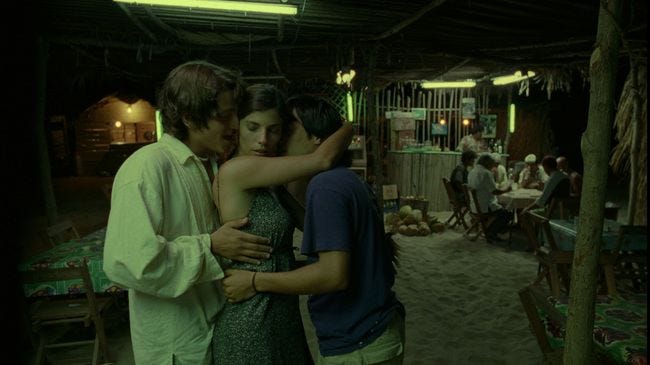Right before directing ‘Y Tu Mamá También, Alfonso Cuaron had just come off of directing Harry Potter and the Prisoner of Azkaban, arguably one of the biggest films of 2004. However, when thinking about his next project, Cuaron wanted to reject commercial blockbuster filming techniques, return to his roots in Mexican cinema, and embrace documentary style filmmaking. From this, Y Tu Mamá También was born.
The film follows two Mexican teenagers, Tenoch, who comes from an upper class political family, and Julio, who comes from a leftist, middle class family, as they descend on a road trip throughout Mexico to an imaginary beach with an older woman named Luisa. As the film progresses, we take breaks from the main characters into the lives of the background characters and how they are affected by the political backdrop of the film, which takes place in 1999, a revolutionary period in Mexican politics where for the first time in seven decades, the nation changed ruling political parties.
Occasionally, the film is interrupted by a voiceover from an unknown and omniscient narrator who gives insight and information about seemingly small and unimportant background characters. A similar technique was also used by Alfonso in his 2006 film "Children of Men”, where the camera will leave the main character and main part of the story and focus on background characters or background shots, highlighting the story behind the story to the viewers. This technique contributes to the world building, reminding us that life doesn’t stop for the background characters after our main trio leaves their presence.
The film also explores various philosophical aspects. Through the character of Luisa who finds out she is terminally ill right before the road trip begins, we explore the liberation that comes with death. Before Luisa finds out she is sick, she is a shy, dejected woman in an unhappy marriage. However, after receiving news of her illness, Luisa rapidly undergoes a drastic change and starts to embrace the little time she has left, even if that embracing comes in the form of engaging in sexual activities with the two teenage boys. Another aspect that's explored is the inherent power imbalance and stereotypical views between the upper and lower class. Despite being best friends for multiple years, the moment Julio and Tenoch get into an argument, Julio calls Tenoch a “bourgeoisie piece of shit” and Tenoch calls Julio a “beggar” and a “commoner”. Even the two boys years-long friendship is unable to withstand the complexities of social and economic inequality.
Although there is some controversy surrounding the age gap between the two boys and Luisa, it's important to acknowledge that the movie doesn't try to paint Luisa as the main character or as the heroine of the story. Luisa is not without her faults. We are meant to learn not from her inherent pedophilia, but from her acceptance of her mortality. Luisa is the living embodiment of the phrase “Carpe Diem”. After years of living in regret and being haunted by her past, she decides to forgive herself and others, and in doing so, begins her transformative healing process, encouraging viewers to do the same.
Since watching it for the first time, the movie has grown to become one of my favourite films. Its sincere yet nuanced depiction of Mexico, a country heavily stereotyped by drug dealers and violence, led to new learning experiences. The acting and chemistry between the three main actors, Maribel Verdu, Gael Garcia Bernal, and Diego Luna was so genuine and intense it almost felt as if we viewers were intruding on certain scenes. Cuaron's dedication to providing background and context to the story voiceover and long continuous shots contribute to the overall sense of awareness. We feel as if we are in the car on the way to Boca Del Cielo ourselves with Julio, Tenoch, and Luisa.
In its investigation of the nature and complexities of life, the movie ends on the perfect quote that encapsulates all the lessons learnt throughout the film. Spoken by the narrator, the last line we are left with states that “Life is like foam, so give yourself away to the sea.” Cuaron invites us to leave our regrets and problems in the past, and give ourselves to the sea, just like Luisa.





